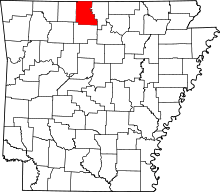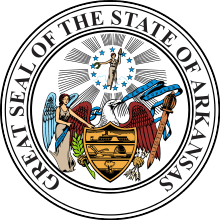Marion County, Arkansas
| Marion County, Arkansas | |
|---|---|
 Marion County courthouse in Yellville | |
 Location in the U.S. state of Arkansas | |
 Arkansas's location in the U.S. | |
| Founded | September 25, 1836 |
| Named for | Francis Marion[1] |
| Seat | Yellville |
| Largest city | Bull Shoals |
| Area | |
| • Total | 640 sq mi (1,658 km2) |
| • Land | 597 sq mi (1,546 km2) |
| • Water | 43 sq mi (111 km2), 6.8% |
| Population (est.) | |
| • (2015) | 16,185 |
| • Density | 28/sq mi (11/km²) |
| Congressional district | 3rd |
| Time zone | Central: UTC-6/-5 |
| Website |
marioncounty |
Marion County is located in the Ozark Mountains in the U.S. state of Arkansas. The county is named for Francis Marion, the famous "Swamp Fox" of the Revolutionary War. Created as Arkansas's 35th county in 1836, Marion County is home to one incorporated town and four incorporated cities, including Yellville, the county seat. The county is also the site of numerous unincorporated communities and ghost towns. The county included part of what is now Searcy County, Arkansas, with many opposing to dividing them, which helped fueled the bloody Tutt-Everett War between 1844 and 1850.
Occupying only 598 square miles (155,000 ha), Marion County is the 18th smallest county in Arkansas. As of the 2010 Census, the county's population is 16,653 people in 3,531 households.[2] Based on population, the county is the twenty-seventh smallest county of the 75 in Arkansas.[3] Located in the Ozarks, the county is largely covered with rugged terrain and waterways, with the exception of King's Prairie in the southwestern portion. It is drained by the White River, Buffalo River, Crooked Creek, and the Little North Fork of White River. Protected areas of the county include Bull Shoals-White River State Park, Ozark National Forest, the Buffalo National River and four wildlife management areas (WMAs).
Although no Interstate highways are located in Marion County, two United States highways (U.S. Route 62 [US 62] and US 412) and six Arkansas state highways run in the county.[4]
History
Marion County was formerly home to a large zinc mining industry. The ruins of the Rush Creek mining district are preserved as the Rush Historic District, which is listed on the National Register of Historic Places.
Geography
According to the U.S. Census Bureau, the county has a total area of 640 square miles (1,700 km2), of which 597 square miles (1,550 km2) is land and 43 square miles (110 km2) (6.8%) is water.[5]
Major highways
Adjacent counties
- Ozark County, Missouri (north)
- Baxter County (east)
- Searcy County (south)
- Boone County (west)
- Taney County, Missouri (northwest)
National protected areas
- Buffalo National River (part)
- Buffalo National River Wilderness
- Ozark National Forest (part)
Demographics
| Historical population | |||
|---|---|---|---|
| Census | Pop. | %± | |
| 1840 | 1,325 | — | |
| 1850 | 2,308 | 74.2% | |
| 1860 | 6,192 | 168.3% | |
| 1870 | 3,979 | −35.7% | |
| 1880 | 7,907 | 98.7% | |
| 1890 | 10,390 | 31.4% | |
| 1900 | 11,377 | 9.5% | |
| 1910 | 10,203 | −10.3% | |
| 1920 | 10,154 | −0.5% | |
| 1930 | 8,876 | −12.6% | |
| 1940 | 9,464 | 6.6% | |
| 1950 | 8,609 | −9.0% | |
| 1960 | 6,041 | −29.8% | |
| 1970 | 7,000 | 15.9% | |
| 1980 | 11,334 | 61.9% | |
| 1990 | 12,001 | 5.9% | |
| 2000 | 16,140 | 34.5% | |
| 2010 | 16,653 | 3.2% | |
| Est. 2015 | 16,185 | [6] | −2.8% |
| U.S. Decennial Census[7] 1790–1960[8] 1900–1990[9] 1990–2000[10] 2010–2015[2] | |||

As of the 2000 United States Census,[12] there were 16,140 people, 6,776 households, and 4,871 families residing in the county. The population density was 27 people per square mile (10/km²). There were 8,235 housing units at an average density of 14 per square mile (5/km²). The racial makeup of the county was 97.52% White, 0.12% Black or African American, 0.76% Native American, 0.20% Asian, 0.05% Pacific Islander, 0.13% from other races, and 1.22% from two or more races. 0.76% of the population were Hispanic or Latino of any race.
There were 6,776 households out of which 26.00% had children under the age of 18 living with them, 61.30% were married couples living together, 7.40% had a female householder with no husband present, and 28.10% were non-families. 24.90% of all households were made up of individuals and 12.40% had someone living alone who was 65 years of age or older. The average household size was 2.36 and the average family size was 2.79.
In the county the population was spread out with 22.10% under the age of 18, 6.00% from 18 to 24, 23.30% from 25 to 44, 28.50% from 45 to 64, and 20.00% who were 65 years of age or older. The median age was 44 years. For every 100 females there were 97.90 males. For every 100 females age 18 and over, there were 94.80 males. The median income for a household in the county was $26,737, and the median income for a family was $32,181. Males had a median income of $22,877 versus $17,729 for females. The per capita income for the county was $14,588. About 11.50% of families and 15.20% of the population were below the poverty line, including 23.50% of those under age 18 and 14.40% of those age 65 or over.
Communities
Cities
- Bull Shoals
- Flippin
- Summit
- Yellville (county seat)
Town
Townships
Note: Unlike most Arkansas counties, Marion County only has one single township (named "Marion County"). That township encompasses the entire county.
Townships in Arkansas are the divisions of a county. Each township includes unincorporated areas; some may have incorporated cities or towns within part of their boundaries. Arkansas townships have limited purposes in modern times. However, the United States Census does list Arkansas population based on townships (sometimes referred to as "county subdivisions" or "minor civil divisions"). Townships are also of value for historical purposes in terms of genealogical research. Each town or city is within one or more townships in an Arkansas county based on census maps and publications. The townships of Marion County are listed below; listed in parentheses are the cities, towns, and/or census-designated places that are fully or partially inside the township. [13][14]
- Marion County
See also
- List of lakes in Marion County, Arkansas
- National Register of Historic Places listings in Marion County, Arkansas
References
- ↑ Gannett, Henry (1905). The Origin of Certain Place Names in the United States. U.S. Government Printing Office. p. 200.
- 1 2 "State & County QuickFacts". United States Census Bureau. Retrieved May 23, 2014.
- ↑ "Find a County". National Association of Counties. Retrieved 2011-06-07.
- ↑ General Highway Map - Marion County, Arkansas (PDF) (Map) (2008-04-15 ed.). Arkansas State Highway and Transportation Department. Retrieved 2016-06-06.
- ↑ "2010 Census Gazetteer Files". United States Census Bureau. August 22, 2012. Retrieved August 27, 2015.
- ↑ "County Totals Dataset: Population, Population Change and Estimated Components of Population Change: April 1, 2010 to July 1, 2015". Retrieved July 2, 2016.
- ↑ "U.S. Decennial Census". United States Census Bureau. Retrieved August 27, 2015.
- ↑ "Historical Census Browser". University of Virginia Library. Retrieved August 27, 2015.
- ↑ Forstall, Richard L., ed. (March 27, 1995). "Population of Counties by Decennial Census: 1900 to 1990". United States Census Bureau. Retrieved August 27, 2015.
- ↑ "Census 2000 PHC-T-4. Ranking Tables for Counties: 1990 and 2000" (PDF). United States Census Bureau. April 2, 2001. Retrieved August 27, 2015.
- ↑ Based on 2000 census data
- ↑ "American FactFinder". United States Census Bureau. Retrieved 2011-05-14.
- ↑ 2011 Boundary and Annexation Survey (BAS): Marion County, AR (PDF) (Map). U. S. Census Bureau. Retrieved 2011-08-23.
- ↑ "Arkansas: 2010 Census Block Maps - County Subdivision". United States Census Bureau. Retrieved May 29, 2014.
External links
 |
Taney County, Missouri | Ozark County, Missouri | Ozark County, Missouri |  |
| Boone County | |
Baxter County | ||
| ||||
| | ||||
| Searcy County | Baxter County |
Coordinates: 36°16′47″N 92°42′57″W / 36.27972°N 92.71583°W
